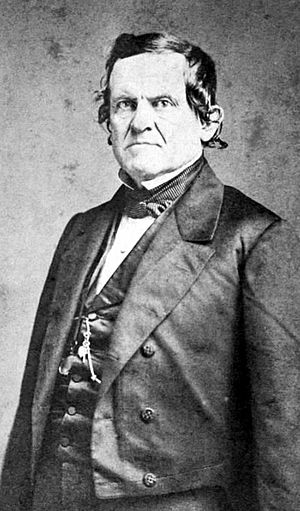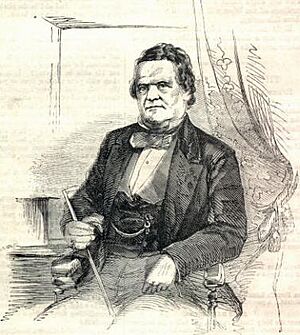Francis Wilkinson Pickens facts for kids
Quick facts for kids
Francis Wilkinson Pickens
|
|
|---|---|
 |
|
| 69th Governor of South Carolina | |
| In office December 14, 1860 – December 17, 1862 |
|
| Lieutenant | W.W. Harllee |
| Preceded by | William Henry Gist |
| Succeeded by | Milledge Luke Bonham |
| United States Minister to Russia | |
| In office January 11, 1858 – September 9, 1860 |
|
| Appointed by | James Buchanan |
| Preceded by | Thomas H. Seymour |
| Succeeded by | John Appleton |
| Member of the South Carolina Senate from Edgefield County | |
| In office November 25, 1844 – November 23, 1846 |
|
| Preceded by | John Speed Jeter |
| Succeeded by | Nathan Lipscomb Griffin |
| Member of the U.S. House of Representatives from South Carolina's 5th district |
|
| In office December 8, 1834 – March 3, 1843 |
|
| Preceded by | George McDuffie |
| Succeeded by | Armistead Burt |
| Member of the South Carolina House of Representatives from Edgefield County |
|
| In office November 26, 1832 – November 24, 1834 |
|
| Personal details | |
| Born | April 7, 1805 or April 7, 1807 Togadoo, Colleton County, South Carolina |
| Died | (aged 61 or 63) Edgefield, South Carolina |
| Resting place | Edgefield, South Carolina |
| Political party | Democratic |
| Other political affiliations |
Nullifier |
| Spouse | Lucy Petway Holcombe |
| Alma mater | Franklin College South Carolina College |
| Profession | lawyer |
| Signature | |
Francis Wilkinson Pickens (born 1805 or 1807 – died January 25, 1869) was an important American politician. He was a member of the Democratic Party. Pickens served as the Governor of South Carolina. This was a very important time in history. South Carolina was the first state to leave the United States.
Pickens came from a wealthy family. They owned large farms called plantations. He was a cousin of US Senator John C. Calhoun. Pickens strongly supported "nullification". This was the idea that states could ignore federal laws they didn't like. He supported this idea while serving in the South Carolina House of Representatives.
As governor, he played a key role in the events leading to the American Civil War. He approved the firing on a ship bringing supplies to Fort Sumter. He also approved the attack on the fort itself. After the war, Pickens helped repeal South Carolina's decision to leave the Union.
Contents
Early Life and Political Beginnings
Francis Pickens was born in Togadoo, South Carolina. His exact birth year is either 1805 or 1807. His gravestone shows the 1807 date. His father, Andrew Pickens, was a former governor. His grandfather, General Andrew Pickens, was a hero of the American Revolution. He fought in the Battle of Cowpens.
Pickens came from a very rich family. In 1860, he owned a lot of land and property. He also owned 276 enslaved people. This was common for wealthy people in the South at that time.
He went to college at Franklin College (now part of the University of Georgia). He also studied at South Carolina College. In 1829, he became a lawyer. He also built a large house called "Edgewood" in Edgefield, South Carolina.
Pickens joined the Democratic Party. He served in the South Carolina House of Representatives from 1832 to 1834. During this time, he strongly supported nullification. This was the idea that states could cancel federal laws. He believed the U.S. Congress should not control the states.
A Career in Government
Pickens served in the U.S. Congress from 1834 to 1843. He represented South Carolina. Later, he was a member of the South Carolina state senate from 1844 to 1846. He was offered jobs as an ambassador to England and France. But he turned down these offers.
In 1850, he was a delegate to the Nashville Convention. This meeting discussed states' rights and slavery. Pickens married Lucy Petway Holcombe in 1856. She was his third wife. They had a daughter named Douschka Pickens in 1859.
From 1858 to 1860, Pickens served as the U.S. Minister (like an ambassador) to Russia. He worked for President James Buchanan. While in Russia, he and his wife became friends with Czar Alexander II.
Role in the American Civil War
Francis Pickens became Governor of South Carolina in 1860. This was a very tense time. South Carolina decided to leave the United States. This act is called secession. Pickens strongly supported this decision. However, he did not actually sign the document of secession himself.
As governor, Pickens demanded that the U.S. government give up its forts in Charleston harbor. He was upset when Major Robert Anderson moved his troops to Fort Sumter. Pickens offered to buy the fort from the United States. He believed the federal union was now broken.
On January 9, 1861, Governor Pickens approved the firing on the ship Star of the West. This ship was trying to bring supplies to the soldiers at Fort Sumter. A few days later, Pickens demanded that President Buchanan surrender Fort Sumter. He said that the fort's presence was not safe for South Carolina. He also approved the later attack on Fort Sumter. This attack started the American Civil War. Pickens remained a strong believer in states' rights.
Life After the War
After the Civil War ended, Pickens was part of a special meeting. This meeting was held in South Carolina in September 1865. Its goal was to decide the state's future. Many important people from South Carolina attended.
During this meeting, Pickens made a motion to cancel the Ordinance of Secession. This was the document where South Carolina had decided to leave the Union. His speech was very short. He said that the ordinance was "hereby repealed."
Newspapers reported that the motion was met with silence. This was a big change from the loud cheers when the secession ordinance was first passed. The motion passed with a vote of 105 to 3. Pickens advised against being stubborn. He urged South Carolina to heal and find peace.
Francis Pickens died in Edgefield, South Carolina. He was buried at Willow Brook Cemetery.
 | Chris Smalls |
 | Fred Hampton |
 | Ralph Abernathy |


